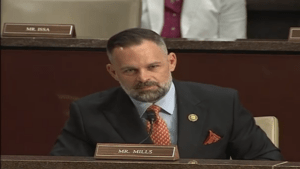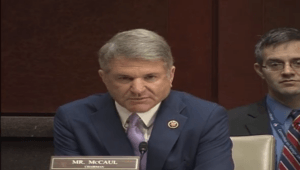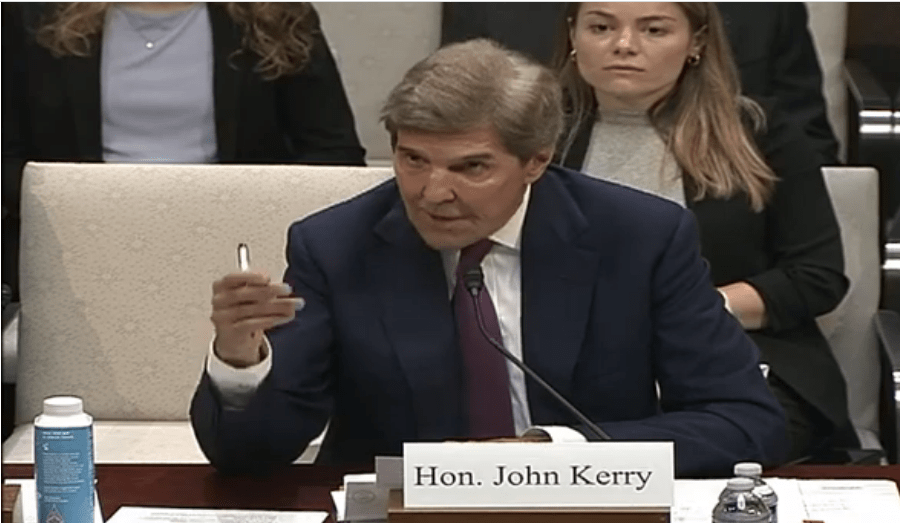John Kerry, the Special Presidential Envoy for Climate Policy at the State Department was grilled by Republicans on Thursday during an Oversight and Accountability Subcommittee hearing at the House Foreign Affairs Committee. Democrats mostly praised the former presidential candidate for promoting policies to reduce greenhouse gas emissions globally, while Republicans were largely on the attack, questioning him about what they perceived to be a limp wristed response to forced labor in the China solar supply chain, as well as breaking U.S. trade laws.
Rep. Cory Mills (R-FL) asked him about importing solar panels with Uyghur “slave labor” – alluding to a comment he was made to the press that choosing between human rights issues in the Uyghur province of Xinjiang and more solar deployment in the U.S. was a difficult choice.
Kerry said he did not recall making that comment, which appeared in the press during sideline conversations at the Glasgow COP-26 United Nations climate summit. He said he doesn’t believe it was a tough choice.
 “You have prioritized rapid deployment of China solar panels over the interest of American manufacturing and over the integrity of Commerce Department investigations,” Rep. Mills said, accusing Kerry of lobbying in favor of the June 2022 emergency solar declaration which saw the White House put a two year moratorium on anti-dumping and circumventing duties against four Chinese solar exporters accused by Commerce for breaking U.S. tariff rules. A final ruling is expected later this summer.
“You have prioritized rapid deployment of China solar panels over the interest of American manufacturing and over the integrity of Commerce Department investigations,” Rep. Mills said, accusing Kerry of lobbying in favor of the June 2022 emergency solar declaration which saw the White House put a two year moratorium on anti-dumping and circumventing duties against four Chinese solar exporters accused by Commerce for breaking U.S. tariff rules. A final ruling is expected later this summer.
“I have never prioritized bringing in solar that prioritizes Uyghur forced labor,” Kerry said, often struggling to get his point across to the Florida congressman.
“We are prioritizing an adversarial nation,” Rep. Mills said. “We are in a resource war with China. Why are we trying to go ahead and build up China economically and not decouple and build American manufacturing in this space?” he said without mentioning solar.
“We are not trying to build them up economically,” Kerry said. “Yes, we are their largest trade partner. But most economists, most investors, do not believe it is possible to totally decouple from China.”
Mills said it was possible to decouple and asked Kerry for his thoughts on the Commerce investigation and the solar emergency declaration, which survived both a House and Senate override vote this year after Biden vetoed it.
At least one of the four companies accused of circumventing duties charged to them in mainland China, BYD Solar, is part of the BYD family, primarily an automotive company that makes EV cars and buses and has had (and may still) Warren Buffet’s Berkshire Hathaway as an investor.
Kerry advocated for the White House here. “There is nothing in Biden’s policy (solar emergency declaration) that helps China,” he said. “The fact is that we used to have a solar industry and China dumped for a number of years and we lost those industries. Now we are trying to get them back. That is the entire purpose of the Inflation Reduction Act. And it is working. It is creating a new solar supply chain in this country. In addition to that, I will say the Uyghur Forced Labor Prevention (UFLPA) law is working,” he said, adding that Customs has held up solar from companies believed to be sourcing materials from Hoshine Silicon Industries, which is a banned commercial entity under the UFLPA.
However, Commerce issued a preliminary determination that determined that Chinese companies operating in Malaysia, Thailand, Vietnam, and Cambodia are illegally circumventing existing antidumping and countervailing (AD/CVD) duty orders on solar cells and modules from China. Additionally, as CPA has written about extensively, the Biden administration’s Solar Emergency Declaration protects Chinese solar manufacturers despite Commerce’s findings.
There were some gotcha moments during the hearing. Rep. Darrell Issa (R-CA) asked him if Xi Jinping was a dictator, but Kerry did not refer to him as such.
Kerry said repeatedly throughout the morning hearing that China was “critical for us to solve the problem of climate change.” He said he believed that progress on this front might help “temper down” overheated relations that may eventually lead to a hot war.
 In his opening statement, House Foreign Affairs Chairman Michael Michael (R-TX) agreed that the U.S., and Kerry needed to maintain dialogue with China.
In his opening statement, House Foreign Affairs Chairman Michael Michael (R-TX) agreed that the U.S., and Kerry needed to maintain dialogue with China.
“I agree you have to talk to them and engage in diplomacy. But we don’t have to make concessions. We stopped enforcing export controls on Huawei just to get a meeting with Chairman Xi recently,” he said. It is unclear if these concessions took place. Huawei received a 90-day export restrictions reprieve once in 2019.
McCaul rightfully stated that China was our biggest source of solar and yet is the “worst polluter on the planet”. He mentioned how the Paris Accord is tipped in China’s favor, as it allows for them to start reducing greenhouse gas emissions by 2030 while the U.S. has to do so immediately.
“They should not have Most Favored Nation status,” McCaul said about China’s position with the American trade regimes.
In his opening remarks, Subcommittee Chair Brian Mast (R-FL) criticized the managerial establishment of Washington that makes policies that affect the country, without elected officials voting on it. Kerry was clearly pinpointed as part of that unelected bureaucracy.
Mast said that Kerry’s office was a closed book and that they have refused Freedom of Information Act requests and that the climate group does not have its own landing page on the State Department’s website. “We don’t even know who works there,” he said.
Ranking Member of the Subcommittee, Jason Crow (D-CO), spoke about reshoring renewable energy materials and manufacturing.
“Securing renewable energy materials from diverse sources around the world is only one part of the puzzle,” he said. “Our policies must also include the onshoring of supply chains. These policies will drive economic growth and strengthen domestic industry.”













